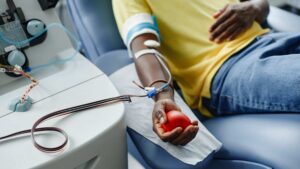CLAIM: Men need to have women and to have sex with them, a lot. Such a man will not have cancer.
SOURCE:Dorothy Mashonganyika (Member of Parliament)
VERDICT: Misleading
This has been a popular claim on social media – and one repeated many times over the years.
An account claimed in 2015 that ‘Ejaculating more than 12 times a month decreases a man’s chances of developing prostate cancer’ but interestingly enough, took this number up in 2019: ‘Men who ejaculated 21 times or more a month were less likely to be diagnosed with prostate cancer than men who ejaculated four to seven times a month, according to 2017 research’
On Facebook an account posted that, ‘2023 HAVARD study affirms that Men who ejaculate more frequently like 21times a month has the least risk of prostrate cancer (sic). The explanation is linked to the fact that ejaculation may help clear substances that could cause cancer from the prostate. Another possibility is that ejaculation releases psychological tension, which may lower central sympathetic nervous activity’.
In 2022, a account on X belonging to a Dr Kasenene (not clear if this is a doctor or not) posted that, ‘Men who ejaculate at least 4 times per week have better protection against prostate cancer. Frequent ejaculation/orgasms are linked to lower prostate cancer risk’. He went on to claim that, ‘Not masturbation bro…
Natural sex’.
So.
Is it 21 times a month? Or 12? And more importantly, is ejaculating (in the cause for prostate cancer prevention, of course) synonymous with having sex with a woman? And is it ok if it is one woman or one needs a whole lot of them?
In a widely circulated video, member of parliament, Mashonganyika claimed that, ‘men need to have women and to have sex with them, a lot. Such a man will not have cancer.’
She goes on to advocate for old men, with same age wives, to be given younger female relatives as second wives – so that the men do not develop prostate cancer.
All this talk of the number of ejaculations being linked to a decrease in chances of developing cancer stems from a Harvard study.
In 1992, 29,342 men between the ages of 46 and 81 provided information about their average number of ejaculations per month in young adulthood (age 20–29), middle age (40–49), and in the most recent year. Ejaculations included sexual intercourse, nocturnal emissions, and masturbation. The volunteers provided comprehensive health and lifestyle data every two years until the study concluded in 2000.
High ejaculation frequency was linked to a decreased risk. Compared to men who reported 4–7 ejaculations per month across their lifetimes, men who ejaculated 21 or more times a month enjoyed a 31% lower risk of prostate cancer. And the results held up to rigorous statistical evaluation even after other lifestyle factors and the frequency of PSA (Prostrate specific antigen) testing were taken into account.
In a Reuters article, the lead study author, Jennifer Read is quoted saying that the results of their study shows that ejaculation and safe sexual activity throughout adulthood could be a beneficial strategy for reducing the risk of prostate cancer.
‘Ejaculation frequency is, to some extent, a measure of overall health status in that men at the very low end of ejaculation – 0 to 3 times per month – were more likely to have other (medical problems) and die prematurely from causes other than prostate cancer,” said lead study author Rider, who did the analysis while working at the Harvard T.H. Chan School of Public Health in Boston, according to the Reuters article.
An Australian study of 2,338 men examined the impact of sexual factors on the occurrence of prostate cancer before the age of 70. Like the Harvard research, the Australian investigation evaluated total ejaculations rather than sexual intercourse itself. Like the American men, the Australians who ejaculated most frequently enjoyed a reduced risk of prostate cancer.
The study found only weak evidence of an inverse association between ejaculatory frequency in the fourth decade of life and advanced PC, which was not significantly modified by number of new sexual partners. No relationship was found for ejaculatory frequency in the third and fifth decades of life.
There are conflicting findings. The greatest controversy regarding these studies is about the age when ejaculation occurs.
A 2008 study determined that men were more likely to develop prostate cancer if they were very sexually active in their twenties and thirties. The study also found no conclusive evidence that masturbation provide greater risk than intercourse.
The Australian study demonstrated a reduced risk of prostate cancer if frequent ejaculation occurred during young adulthood.
There are two issues. The first one is that the studies evaluated the total ejaculations rather than sexual intercourse itself. The reduced risk of prostrate cancer came with the increase in the number of ejaculations, not necessarily sexual intercourse.
The second is that of age – some of the studies suggests that the reduced risk occurs if frequent ejaculation occurred in young adulthood.
Conclusion
The claim by member of parliament, Dorothy Mashonganyika, that ‘Men need to have women and to have sex with them, a lot. Such a man will not have cancer’ has been rated as misleading.
Her attempt to advocate for old men to be given young girls/women for sex in the name of preventing prostate cancer is misleading and not supported by any science. Studies that have been carried out show that, firstly, it is ejaculation, not necessarily sexual intercourse, that is a factor in reducing the risk of prostate cancer. Secondly, for this to happen, some of the studies suggest, the frequent ejaculations have to have occurred in young adulthood. Giving young girls/women to old men in marriage is a contravention of certain rights and laws.











